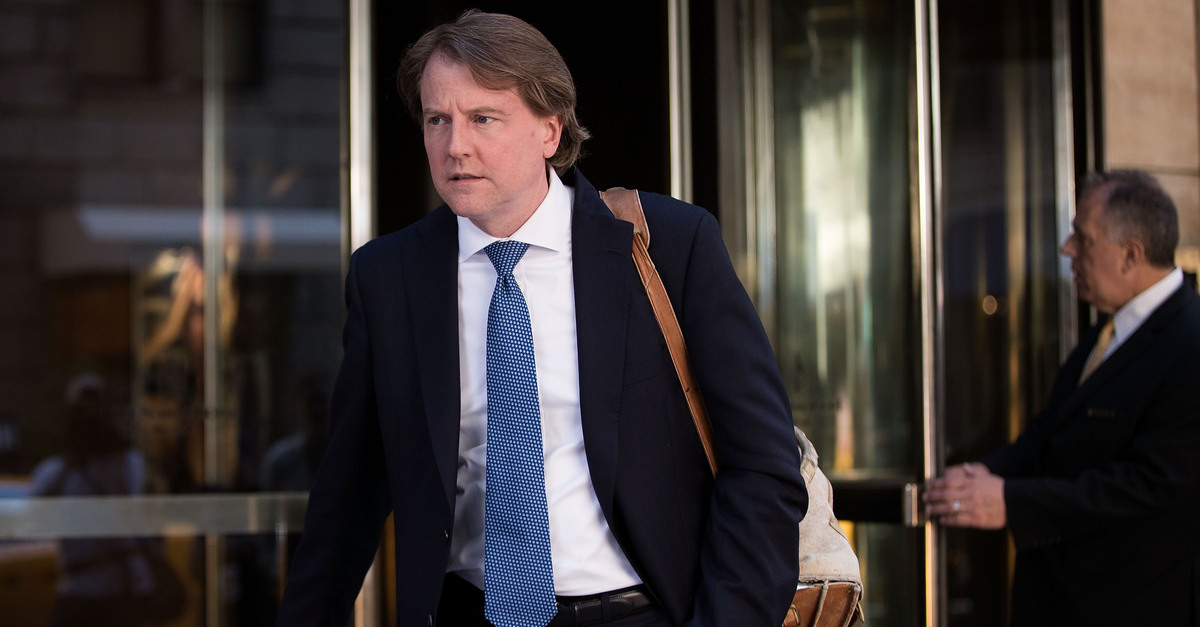
A bipartisan group of former lawmakers and executive branch officials urged the D.C. Circuit court to revisit last month’s decision in the case of former White House counsel Don McGahn, saying the court’s ruling threatened to upend the American constitutional system of checks and balances.
A three-judge panel last month ruled that federal courts are prohibited from resolving subpoena disputes between the legislative and executive branches, severely curbing Congress’s executive oversight capabilities and setting the stage for a decision that will have significant implications for constitutional separation of powers.
In a 31-page amicus brief seeking to have the case appealed to the full circuit panel, the coalition of former public servants – which included former Secretaries of Defense Leon Panetta and Bill Cohen – implored the court to “consider this case of extraordinary national importance.”
According to the brief, the panel’s decision in Committee on the Judiciary v. Donald F. McGahn, eliminated any incentive for the executive branch to participate with the legislature in the oversight accommodations process, thereby threatening the foundational principle of checks and balances in American governance.
“If courts are unavailable as a last resort to resolve a question of law, then the Executive will have no reason to engage in the accommodations process which has long governed congressional requests for information from the Executive to carry out Congress’s oversight and legislative functions,” the group wrote. “[T]he panel decision invites a seismic shift in the relationship between the Legislative and Executive Branches. The decision will effectively end the process of accommodations between the political branches by removing the Executive’s willingness to compromise with Congress […] once that happens, Congress inevitably will be starved of the information it needs to effectively check the Executive Branch, including the very checks to which the panel opinion would require Congress to resort in order to enforce subpoenas.”
The brief took particular umbrage with the Trump administration’s stonewalling of congressional oversight requests and declarations of “absolute immunity” from inquiries without invoking executive privilege, saying the Court’s initial decision acquiesced in the executive’s “power grab” over the accommodations process.
“[B]oth political branches have understood that Congress can turn to the courts as a last resort to decide questions of law, consistent with the duty of the judiciary ‘to say what the law is,’” the brief stated, citing to Marbury v. Madison, which established the principle of judicial review. “If the judiciary abdicates from this duty, the Executive Branch will have succeeded in effectively neutralizing the accommodations and congressional-oversight processes, severely undermining Congress’s ability to check the Executive and weakening our system of checks and balances.”
The brief also noted that the panel’s decision relied on Congress having “political tools” at its disposal to entice the executive branch to comply with requests, but argued that such mechanisms are impracticable, particularly if the court’s decision stands.
“Take, for example, the power to impeach,” they wrote. As John Quincy Adams explained, it would make a ‘mockery’ of the House’s impeachment power for the House to have the power to impeach but not ‘the power to obtain the evidence and proofs on which their impeachment was based.’”
Other methods of extracting information from the executive, such as imprisoning presidential advisors for contempt of Congress risks a potential violent confrontation between the Sergeant-at-Arms and law enforcement officials that “should ring constitutional alarm bells.”
Read the full brief below:
McGahn Amicus by Law&Crime on Scribd
[image via Drew Angerer/Getty Images]